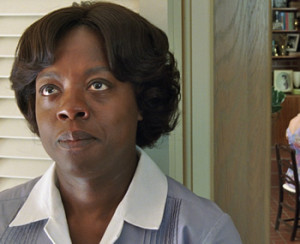By Dwight Brown NNPA Film Critic
“The Help,” a best-selling book about a white woman who helps black maids rebel in the 1960s segregated south, was probably a better read than it is a cinematic experience. On the big screen, the white “savior” liberating black people storyline seems dated and almost offensive.
Skeeter (Emma Stone) is an awkward, outspoken young woman who returns to Jackson, Mississippi after graduating from Ole Miss. She’s heartbroken when she finds out her favorite maid (Cicely Tyson) is no longer with the family. Skeeter is a wannabe journalist, and haphazardly gets a job at the local paper as a cleaning-hints columnist. She hasn’t a clue what to write, and for advice turns to Aibileen Clark (Viola Davis), the wise maid of her best friend.
Skeeter is also trying to get a book published. A very nitpicky New York editor (Mary Steenburgen) isn’t interested in any of her proposals, until Skeeter suggests writing a book about Jackson’s maids and their bosses. Aibileen, who isn’t all that happy with her employer, is the first to commit. Her high-strung, smart mouthed friend Minny (Octavia Spencer) is next, and she lambasts her bigoted boss Hilly (Bryce Dallas Howard). Other maids decline, until one is arrested and beaten for theft. The revealing, personal anecdotes make for salacious reading, and when the book is published it causes quite a stir.
Author Kathryn Stockett was raised in Jackson, spent some time in New York in the publishing world, and now lives in Atlanta. This is her first novel, and you don’t have to be a psychiatrist to determine that Skeeter is her alter ego. Her book’s characters are distinct, the southern, period setting is unique, and the narrative about maids giving their bosses hell is engaging.
On screen however, under the direction of actor-turned-screenwriter/director Tate Taylor, the story seems hollow, the characters (minus Skeeter) are two-dimensional, and the casualness of the racism (yes, white people call the maids the “n” word) is revolting. Also, the mix of drama and comedy does not gel, is unsettling and the tonal shifts are disorienting. One minute Minny is being forced to go to the bathroom outside like a dog, and the next she is comically sassy and smart-mouthed like Hattie McDaniels in “Gone With the Wind.”
On the other hand, the film blows the lid off the myth that black people in subservient occupations are happy and docile. Most of the racist white characters look imbecilic and demonic. And some of the sisterhood depicted in the film is endearing.
The film production elements are iffy at best: The lighting is too bright. The costumes don’t seem real. Skeeter’s obtrusive wig looks like a mop. The musical score is not an asset.
The one element the film gets pitch perfect is Viola Davis’ touching, deep and powerful portrayal. Her raw emotions give certain depth to the character. It’s an Oscar caliber performance from a woman who won a Tony Award for the revival of “Fences.” The rest of the cast isn’t as stellar. Emma Stone is too pretty to play an awkward looking adolescent who can’t find a boyfriend. Bryce Dallas Howard gives a tone-deaf performance as the satanic Hilly. Octavia Spencer’s interpretation of Minny is over-the-top and buffoonish. The bugged eyes, the cocked head, the backtalk. It’s almost like she stepped out of a Tyler Perry sitcom and got lost in this movie.
No American-made, major-release film of record has ever explored racism and segregation in the south from a black person’s perspective. Not “Mississippi Burning.” Not “Ghosts of Mississippi.” This film, like the aforementioned, depicts a white person saving black people from the horrors of segregation and racism, which is a distortion of history. Largely, black people were their own saviors and paid the price for doing so.
“The Help” needed a female director’s perspective, and an African-American female filmmaker, specifically, would have been a smart choice. For example, Gina Prince-Bythewood directed the “Secret Life of Bees,” another movie about the south, and demonstrated the sensitivity and restraint a film of this ilk requires. Pity she didn’t get hired to direct this film.
Visit NNPA Film Critic at DwighBrownInk.com
